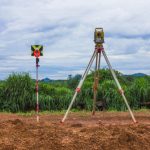Precision Agriculture: Land Surveying in the Farming Industry

1. Mapping and Land Use Planning:
Land surveying plays a pivotal role in mapping and land use planning in precision agriculture. With the help of GPS technology, farmers can accurately map their fields and identify various physical characteristics, including topography, soil composition, and drainage patterns. This information allows them to create detailed maps of their farmland, delineating different zones and optimizing land use. By understanding the variations in soil fertility, moisture levels, and elevation, farmers can design crop management strategies tailored to each specific area of the field, maximizing crop productivity.
2. Variable Rate Application:
One of the significant advantages of precision agriculture is the ability to apply inputs, such as fertilizers and pesticides, at variable rates. Land surveying allows farmers to identify areas of the field with different nutrient requirements and apply inputs accordingly. By precisely targeting specific areas that need more or less of certain inputs, farmers can avoid unnecessary expenses and reduce the risk of overusing chemicals. This approach not only optimizes resource usage but also minimizes environmental impacts.
3. Yield Monitoring:
Accurate land surveying helps farmers monitor and analyze crop yields across different areas of their fields. By using satellite imagery or drones equipped with advanced sensors, farmers can gather data on crop health, growth, and yield. This information is then combined with the precise field maps obtained through land surveying, allowing farmers to identify yield variations and patterns. With this knowledge, farmers can better understand the factors influencing crop productivity, make necessary adjustments to management practices, and address issues promptly to improve overall yield.
4. Drainage and Irrigation Management:
Water management is critical for crop success, and land surveying aids in optimizing drainage and irrigation systems. By precisely measuring land elevation and slope, land surveyors can help farmers design and install effective drainage systems that prevent waterlogging and ensure adequate soil moisture levels. Similarly, through land surveying, farmers can identify areas in their fields that require more or less water. This data enables them to implement precision irrigation systems that minimize water wastage and ensure crops receive just the right amount of water, enhancing water-use efficiency.
5. Soil Conservation:
Effective soil conservation practices are essential for sustainable agriculture. Land surveying provides farmers with valuable information about soil erosion, compaction, and nutrient depletion. By analyzing these soil parameters, farmers can take proactive measures to mitigate soil erosion, such as contour plowing, terracing, or planting cover crops. Land surveying also helps in identifying areas susceptible to soil compaction, enabling farmers to adjust equipment usage and implement techniques like controlled traffic farming to minimize compaction and maintain soil health.
6. Precision Planting:
Precision planting is another area where land surveying is instrumental in precision agriculture. Through accurate mapping and data analysis, farmers can assess the suitability of different areas of their fields for specific crops or plant varieties. This information allows for precise planting decisions, ensuring that crops are placed in the most optimal locations. Farmers can use the survey data to create planting maps, guiding automated planting equipment to sow seeds with the desired spacing and depth. By achieving uniform planting across the field, farmers can optimize crop establishment and maximize yield potential.
Summary
Land surveying is a vital component of precision agriculture, providing farmers with essential data to optimize their operations. By accurately mapping and analyzing their land, farmers can make informed decisions regarding land use, variable rate application, irrigation and drainage management, soil conservation, yield monitoring, and precision planting. With the help of modern surveying techniques and technology, the farming industry can reap the benefits of increased productivity, resource efficiency, and sustainable practices. As precision agriculture continues to revolutionize the industry, land surveying remains a cornerstone in the quest for efficient and sustainable farming practices.
Need Site Engineers & Land Surveyors in Seguin, TX?
Bettersworth & Associates, Inc. is an experienced team of resourceful and award-winning land planners. Established in 1953 in Seguin, Texas, we have gained recognition in creating better places in which to live, learn, work and play. Our goal is to improve the value of our clients’ land resources in a way that advances their missions and improves their communities. We are proud of the long-term relationships we have developed with our clients through creative and responsive advocacy. These relationships have helped us earn a reputation for getting noteworthy projects built in each industry we serve. Call us today!
Categorised in: Land Surveying
